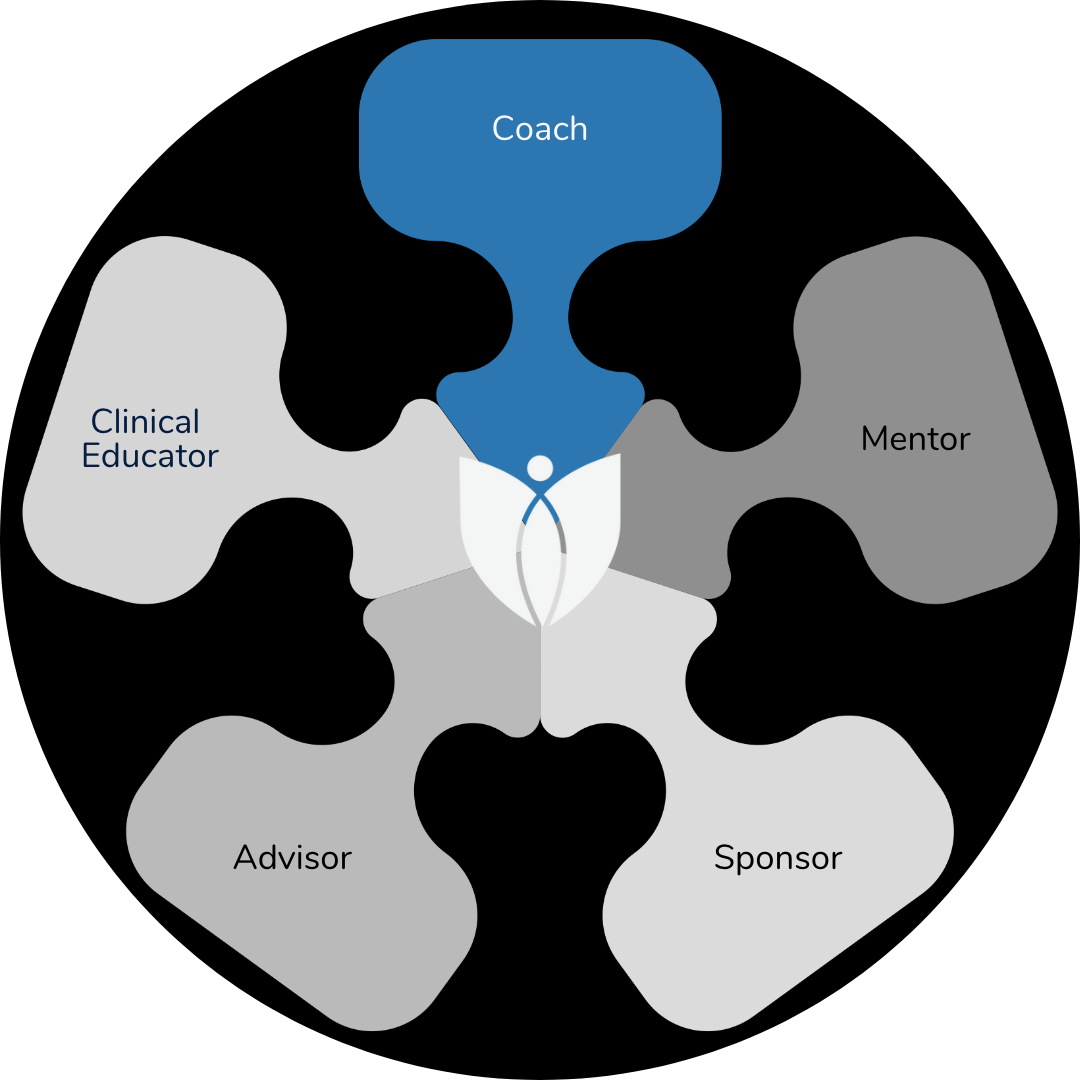
Physician Coaching vs Mentoring, Clarifying the Roles in Academics
Last week, I walked through personal reflections about mentoring vs. coaching from the perspective of a former core faculty member and current coach in academics. This week, I want to take a stab at explaining the difference and the overlap.
As Faculty. First, let’s think through the five primary ways we relate to trainees. Dr. Tony Tsai, with the University of Utah Health, Utah Advancement Coaching Network does a great job delineating four key relationships in this graphic – Advising, Sponsorship, Mentoring, and Coaching. I’ll paraphrase and add my take below.
Advising draws on your expertise to address specific information. Examples include:
- What are the requirements for graduation?
- Which milestone(s) are needing the most attention based on feedback?
- What resources are available to shore up their knowledge in an area?
- What are the processes and requirements for an away rotation?
- What needs to be considered for PTO, sick days, and FMLA in regard to the program, ABFM, and ACGME requirements?
- What's the best approach to navigate challenging personalities of community specialists?
Advising draws upon your expertise in the area to direct trainees in regard to their choices. You often need to be directive about their options. The resident is the one, though, who must take the action. Advisees are typically assigned core faculty members without choice in the matter.
Sponsorship draws on your social and professional capital to endorse and network a trainee - advocating for them and connecting them to opportunities. Championing for your trainee to have a seat at the table, be included on a research team, or be considered for a leadership role. It often takes you being more directive in the actions they consider. And it puts your reputation on the line. This takes effort but is a nice enhancement to the role of ally. Sponsorships are intentional, with one side or the other initiating the relationship.
Mentoring draws on your perspective and experience to help guide and encourage the trainee along your shared pathway in medicine as well as outside of medicine. It can involve modeling work-life balance, helping them develop their goals, troubleshooting common challenges, and helping them see the bigger picture. A mentor relationship is usually a longer-term relationship that endures past graduation. Mentors are sometimes assigned. However, many happen naturally. And the thing that I’ve been realizing over the past three years is that not every resident and fellow (or attending, for that matter) can easily identify a mentor.
Coaching draws upon your deep listening skills, the ability to create a safe, non-judgmental space, and skills to draw out the resident's awareness while suspending your own ideas on the “best thing.” Trusting that the resident is whole, capable, and resourceful and has their own best answers. It helps the trainee gain internal clarity and confidence for the facilitation of evolving their professional identity, goals, strategies, and how to integrate those with life. A coaching relationship can be assigned or chosen with formal coaching depending on the institution. And a coaching approach can naturally unfold while wearing any of your other hats. You likely have learned some coaching skills organically, and you can benefit further from additional education here (not to mention experiencing coaching for yourself).
Educating is the fifth relationship you have with trainees not included in the framework by Utah. This, of course, is when you draw upon your medical knowledge and clinical skills and match the teaching style to the learner in various settings. It’s also the one in which you use your experience and observations for formative feedback.
With time, experience, and familiarity with the individuals, we learn to pivot in and out of the roles and approaches. We learn to trust our intuition when it’s time to combine multiple hats or favor one approach over another. For example, when you are the attending on service, you are facilitating education and patient care primarily, but you are often mentoring simultaneously. You may even sidebar to impart advice, and maybe you even coach. In formal advising sessions, you give them the steps to meet the milestones and graduation requirements and navigate their educational process. And you will likely give time to unpacking the feedback of others and use some coaching (as demonstrated effective in UW's Prepare to ADAPT model) or mentoring during the session. I capture this in the model below and will write a bit more in a couple of weeks.

As a resident or fellow. Above, I explained the various roles from the faculty member's perspective. From the trainee's viewpoint, it’s helpful to understand that a mentor guides, directs, or even shepherds you based on their experience. You usually gravitate to mentors that you want to emulate and who have taken paths that are similar to your plans. In a way, they take you under their wing to offer safety and grounding while imparting their wisdom to you. You have questions. They have suggestions based on years of experience. These, typically, are enduring relationships.
A coach, on the other hand, partners with you to create a safe space where you can explore your internal thoughts, beliefs, and fears in order to help you find your own best answers in identifying your goals, using your strengths, and deriving from those an internal motivation to move forward in an authentic manner. You design your plans as you learn to trust your gut with a thought facilitator. Coaches don’t bring an agenda. They know you have your own best direction and answers. If you are expecting a coach to mentor or advise you and give answers, you may be caught off guard at first. They promote your strengths, reflect, frame, and use powerful questions to help you unlock your own finest direction to form your professional identity, your personal alignment, and the integration as your whole self. Sometimes they may make a teaching point, but they hold loosely to how that impacts you. You are empowered to say, "Yea, that doesn't really land for me." The coaching relationship becomes more fine-tuned as you're more open to self-reflection and courageous in your vulnerability. There is no judgment.
You may identify when your attending is taking a coaching approach, a mentoring approach, or blending the two together in a skillful manner. Coaches that are external to your department or organization offer more of a pure coaching experience. There are benefits to both approaches. Your attendings bring a more intimate contextual understanding and their physical presence. An external coach brings the assurance of a safe space as they have no supervisory, evaluative, or reporting role. Don't be afraid to ask for different approaches and learn when one hat benefits you more than the others.
Okay. With that unpacked, I’ll pause here. Next week, I will get back to how this applies to those of us who are academic physicians who coach trainees and how it also applies to the trainees interacting with coaches in the academic space as well.
Until then, have a joy-filled week! Tonya
Learn how I partner with family medicine residencies as a coach.
Join Weekend Reads
Weekly insights, tips, and tools for physicians who want to thrive—plus a dash of fun.
We hate SPAM. We will never sell your information, for any reason.

